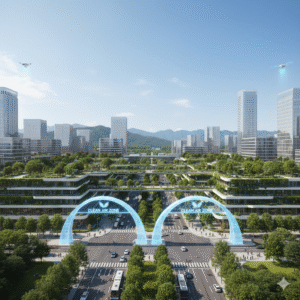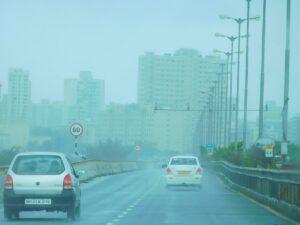Aiming towards accelerating efforts by cities, the central government in September 2022, raised the NCAP goal from aiming for a 20–30% PM₂.₅ and PM₁₀ reduction by 2024 to a 40% reduction by 2026, encouraging state governments, including Andhra Pradesh, to ramp up efforts. In 2017, the Global Burden of Disease Study pointed to approximately 45,000 pollution-related premature deaths in Andhra Pradesh, making air pollution one of the top risk factors, which made it the state’s health priority. The state is also witnessing rapid motorisation, construction, and industrial activity.
As part of the U-CAN Fellowship, my host organisation, Artha Global’s approach mainly focuses on helping governments and leaders ideate, innovate, implement and institutionalise policy solutions. Their approach builds on almost a decade of working closely with central, state and local governments in India. In line with this, Artha Global identified air quality as a priority issue and approached select states including Andhra Pradesh, to initiate long-term work in the sector.
Among the states which were approached, Andhra Pradesh welcomed Artha Global’s support to develop and implement air quality improvement strategies. The team reached out to several cities in the state, including Vijayawada, Visakhapatnam, Guntur, and Kurnool, among the 13 non-attainment cities identified under NCAP in the state. Eventually, Vijayawada and Visakhapatnam came on board as partner cities, showing keen interest in strengthening their work around air quality.
Visakhapatnam
Visakhapatnam has been working to improve air quality like increasing green cover, introducing mechanised street cleaning, upgrading road infrastructure to reduce dust, and improving waste management systems. The city is also engaging with industries to control emissions and encouraging the port to adopt eco-friendly systems and renewable energy.
Vijayawada
Vijayawada’s efforts include improving traffic flow, planting trees, promoting electric and cleaner fuel vehicles, and installing smart traffic and parking systems. New air quality monitoring systems have been set up, and public areas are being upgraded with better lighting and traffic signals to relieve congestion.
These ongoing efforts offered a strong foundation for Artha Global to anchor its work in both cities. This brings us to an important question: How does a policy think tank decide where to begin? Should it be driven by the need-of-the-hour/ urgency? Impact potential? Available funding? Or the promise of quick wins?
Over the course of interactions with the team at Artha, I’ve gained a deeper understanding of how such organisations navigate these choices. There’s no single answer. The approach depends on a mix of factors: technical expertise, ease of intervention, openness of the city to new policy interventions, availability of funding, and the organisation’s own prior experience in the sector.
As a U-CAN Fellow, this journey has offered me a dual vantage point: seeing the strategy unfold from the outside, and also contributing to the work directly. It’s been a valuable exposure to the real-world complexities of driving urban policy and public health outcomes.


